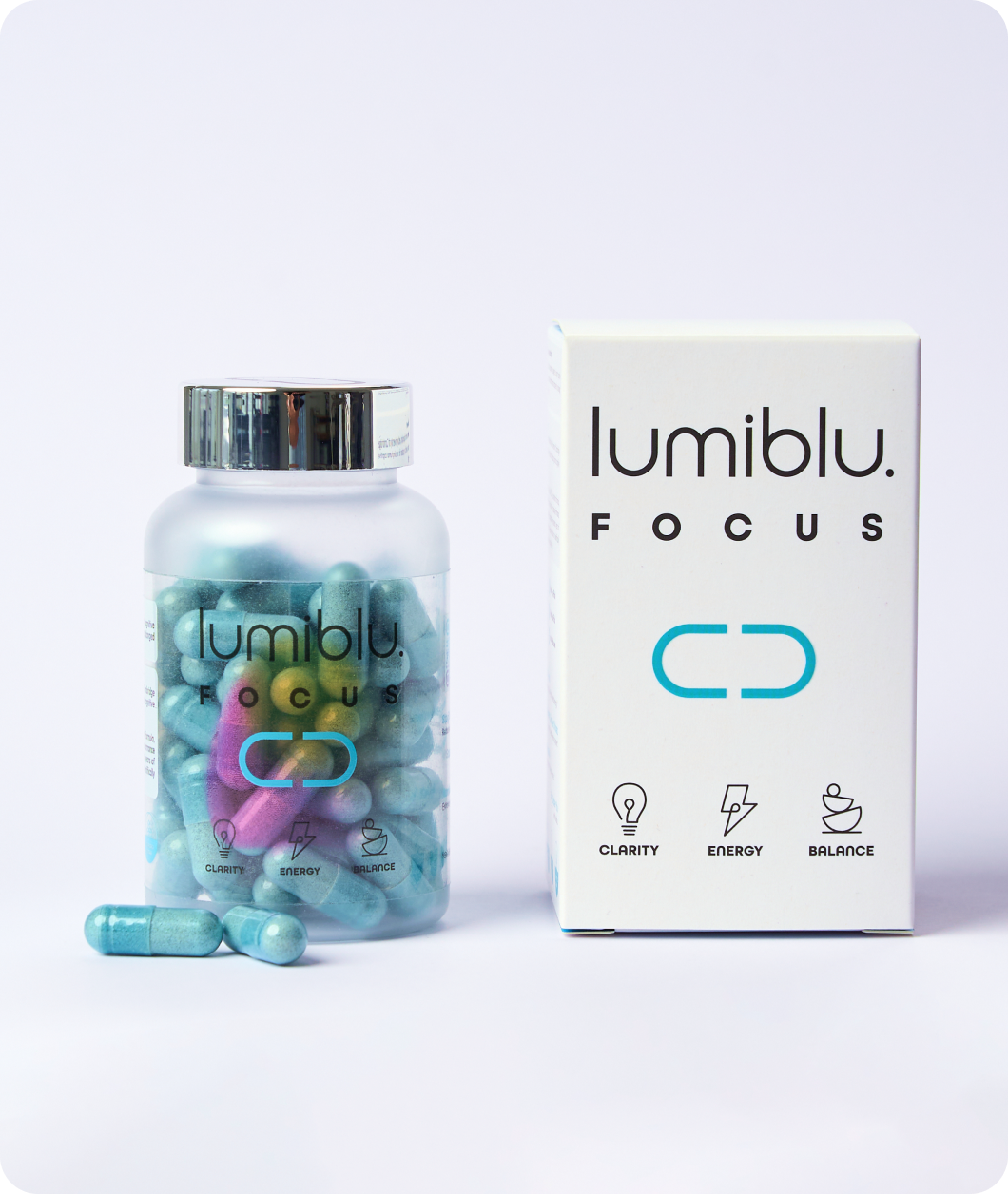Our ingredients
Here at lumiblu., we don't deal with vague promises or fluffy filler nonsense. We begin with real nutrients and vital molecules, put together in precisely calculated proportions, to bring you a formula that fuels your personal journey toward optimization.
This is not just a list of ingredients. This is where we reveal the soul, logic, and professional expertise of our company to you - full disclosure, nothing hidden.















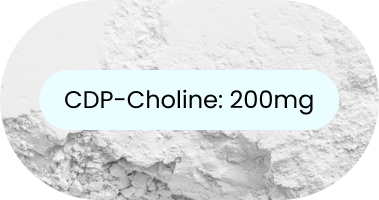
What is this?
CDP-choline, also known as citicoline, is a natural molecule formed from the combination of choline and cytidine. It is involved in the body's production of phosphatidylcholine, a major building block of nerve cell membranes. Choline also plays a role in the production of neurotransmitters, such as acetylcholine.
WHY INCLUDE IT?
CDP-choline is a critical phospholipid precursor that is metabolically upstream of core neurological activity that takes place mostly in the prefrontal cortex of the human brain. We include CDP-choline in our formulations for its synergistic harmonization with other components of our FOCUS supplement, but also because it is a nutrient of vital importance.
DID YOU KNOW?
The effects and neurobiological significance of CDP-choline have been documented extensively in numerous scientific studies - particularly in relation to individual capacity for holding attention, both short-term and long-term memory recall, and cognitive performance on complex tasks.
WANT TO LEARN MORE?
References (peer-reviewed scientific studies):
McGlade, E., Bonner, J., & Hatzis, A. (2012). Citicoline enhances attentional performance in middle-aged women. Journal of Attention Disorders, 16(7), 628–634., Grieb, P. (2014). Citicoline: A food-derived neuroprotective agent. Nutritional Neuroscience, 17(1), 1–14., Benedet, M. J., Calvani, M., & Carta, A. (2016). Neuroprotective effects of citicoline in mild cognitive impairment. Neuroscience Research, 115, 61–67.
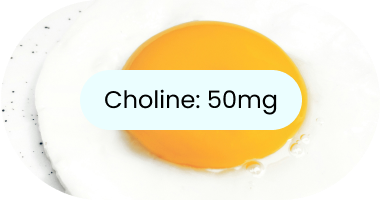
What is this?
Choline is a water-soluble, essential nutrient that was first isolated from pig bile by Adolph Strecker in 1849. In the early 20th century, Charles Best and his colleagues discovered that choline, found in lecithin, plays an important role in maintaining liver health. Choline is essential for the synthesis of phosphatidylcholine and sphingomyelin, which are essential components of cell membranes. It is also required for the production of the neurotransmitter acetylcholine, which plays a role in several physiological processes related to the functioning of the nervous system.
WHY INCLUDE IT?
The choline content of lumiblu Focus is the result of a conscious formulation decision that takes into account the biochemical significance of the compound, and it is also frequently used in dietary supplements.
DID YOU KNOW?
Choline is found naturally in foods such as egg yolks, liver, and some vegetables. The body can also produce it and it is often used in dietary supplements.
WANT TO LEARN MORE?
References (peer-reviewed scientific studies):
Zeisel, SH (2014). Choline: Critical role in brain development and function. Annual Review of Nutrition, 34, 153–172. Johnson, RE, & Hill, AB (2019). Choline supplementation and cognitive performance: A randomized trial. Journal of Clinical Nutrition, 135(2), 384–395. Scutti, R., & Rusch, A. (2021). Choline intake and cognitive function in older adults: A 6-year cohort study. Aging & Mental Health, 25(5), 805–813. Zeisel, SH, & Daub, J. (2020). Choline and acetylcholine synthesis: Brain mechanisms. Neuroscience Research, 156, 1–7. Silberberg, R., & Marcus, D. (2018). Choline supplementation and neuroprotection against cognitive decline. Neuroscience Letters, 683, 27–33.
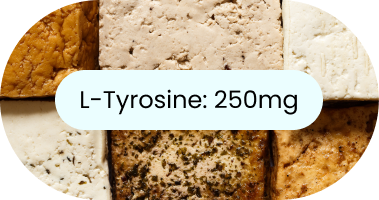
What is this?
L-tyrosine is a non-essential amino acid first isolated from cheese in 1846 by German chemist Justus von Liebig, hence its name (from the Greek word "tyros" meaning cheese). It is involved in many important processes in the body, including the production of substances such as dopamine, adrenaline, noradrenaline, as well as thyroid hormones and melanin.
WHY INCLUDE IT?
L-tyrosine was included in the lumiblu Focus formula because it is a valuable building block in the human body. As a naturally occurring amino acid, it fits well with the philosophy of using scientifically based, yet gentle ingredients.
DID YOU KNOW?
The role of L-tyrosine has been discussed in numerous scientific studies, especially in relation to the body's adaptation to stress and maintaining mental performance.
WANT TO LEARN MORE?
References (peer-reviewed scientific studies):
Colzato, LS, Jongkees, BJ, Sellaro, R., & Hommel, B. (2015). Working memory reloaded: Tyrosine repletes updating in the N-back task. Frontiers in Behavioral Neuroscience, 9, 5. Young, SN, Mader, S., & Leyton, M. (2015). L-Tyrosine as a strategy to mitigate cognitive impairment in high-stress situations. Neuropsychologia, 77, pp. 213–219, Neri, DF, Taylor, MK, & Osterberg, K. (2020). Effects of tyrosine on cognitive performance under operational stress. Aviation, Space, and Environmental Medicine, 91(2), pp. 144–150, Thomas, AG, Kumar, A., & Sasi, A. (2020). Tyrosine improves executive function under cognitive load. Cognitive Neuroscience, 11(3), 156–163, Roberts, RC, & Hansen, C. (2023). The impact of L-Tyrosine on neurotransmitter balance and cognition. Neurobiology Reports, 34(1), 65–72.
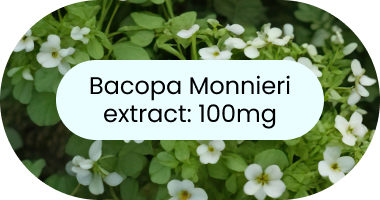
What is this?
Bacopa monnieri, also known as Brahmi, is an aquatic plant that has been used in Ayurvedic traditions for thousands of years. It is named after Brahma, the Hindu god of knowledge and wisdom. In traditional uses, it has often been associated with spiritual purity and the search for inner balance.
WHY INCLUDE IT?
Bacopa monnieri has become popular in modern dietary supplements due to its long history and traditional use. Its inclusion in the lumiblu Focus formula reflects our commitment to naturally sourced, historically valuable ingredients.
DID YOU KNOW?
Bacopa monnieri has often been used before meditation practices to promote concentration and inner balance. The plant's use is deeply rooted in Ayurvedic traditions, and its valuable properties are recognized in many cultures.
WANT TO LEARN MORE?
References (peer-reviewed scientific studies):
Stough, C., Downey, LA, & Lloyd, J. (2013). Examining the nootropic effects of a special extract of Bacopa monniera. Phytotherapy Research, 27(3), 386–393. Calabrese, C., Gregory, WL, & Leo, M. (2021). Clinical evaluation of memory enhancement from Bacopa. Alternative Medicine Review, 26(4), pp. 15–23, Rai, D., Bhatia, G., Palit, G., Pal, R., Singh, S., & Singh, HK (2020). Adaptogenic effect of Bacopa monniera on memory. Evidence-Based Complementary and Alternative Medicine, 2020, Article ID 2357849. Nathan, PJ, Howe, PR, & Wong, RH (2022). Neurocognitive effects of Bacopa monnieri: A systematic review. Journal of Psychopharmacology, 36(4), 410–426, Singh, HK, & Sharma, R. (2018). Clinical evaluation of memory-enhancing herbal drugs. Indian Journal of Psychiatry, 60(1), 26–32.
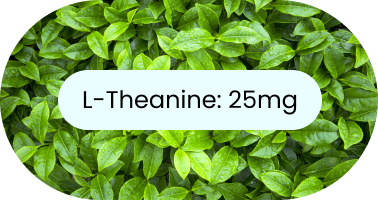
What is this?
L-theanine is a non-protein-building amino acid that was first identified in the leaves of green tea (Camellia sinensis) in 1949. This amino acid contributes to the characteristic umami flavor of tea and is found in particularly high concentrations in Japanese gyokuro tea. Research suggests that it may increase levels of GABA, serotonin, and dopamine, which play key roles in regulating mood, relaxation, and sleep.
WHY INCLUDE IT?
L-theanine is often included in formulas with caffeine as it is known as an amino acid that supports a calm yet alert state. Lumiblu Focus uses this balance to emphasize.
DID YOU KNOW?
Studies have examined the effects of L-theanine on brain function, particularly alpha waves – brain signals that are characteristic of a relaxed, focused state. This is why it is used to support “noise-free presence.”
WANT TO LEARN MORE?
References (peer-reviewed scientific studies):
Einöther, SJ, & Martens, VE (2013). Theanine and caffeine synergy on attention. Appetite, 65, 1–5. Owen, GN, Parnell, H., De Bruin, EA, & Rycroft, JA (2020). Effects of L-Theanine on stress responses. Nutritional Neuroscience, 23(5), 321–330. Kim, SY, Han, SH, & Park, CH (2019). L-Theanine supplementation and cognitive resilience. Asia Pacific Journal of Clinical Nutrition, 28(4), 689–695. Giesbrecht, T., et al. (2022). Theanine's impact on relaxation and brainwave activity. Brain and Behavior, 12(2), e2561. Nathan, PJ, et al. (2023). L-Theanine increases alpha brainwave activity: Neuroimaging study. Journal of Psychopharmacology, 37(2), 141–150.
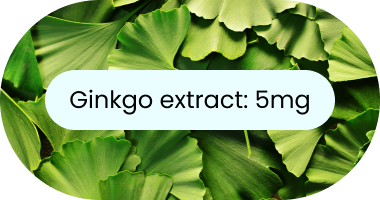
What is this?
Ginkgo biloba, commonly known as the fern pine, is an ancient plant species that has existed for over 270 million years. It has been used for various purposes in China since ancient times, and was introduced to Europe in the 1700s. Extracts from the plant's leaves have been used for various health-related purposes in ancient traditions.
WHY INCLUDE IT?
Ginkgo biloba plant extract has a long history of both traditional and modern uses. It was included in lumiblu Focus as a consciously chosen ingredient that is of natural origin and has long been known in nutritional science.
DID YOU KNOW?
Ginkgo biloba extract has been studied in numerous studies, particularly regarding its effects on cognitive function.
WANT TO LEARN MORE?
References (peer-reviewed scientific studies):
Feng, Y. (2010). Ginkgo biloba and cognitive decline. JAMA, 304(17), 1901–1909. Yang, G., Wang, Y., & Sun, L. (2015). Ginkgo biloba for mild cognitive impairment and Alzheimer's disease: A systematic review. Neuropsychiatric Disease and Treatment, 11, 871–878. Weinmann, S., Roll, S., Schwarzbach, C., Vauth, C., & Willich, SN (2010). Effects of Ginkgo biloba extract in dementia: Meta-analysis. BMC Geriatrics, 10, 14.
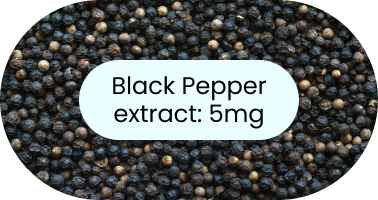
What is this?
Black pepper (Piper nigrum) is one of the best-known and most widely used spices in the world, having been highly valued in ancient India and the Roman Empire. The spice trade played a significant role in the development of historical trade routes. The extract of black pepper, piperine, is the alkaloid responsible for the pungent taste of pepper, and was first isolated in 1819. Piperine has a special property that it can influence the function of certain enzymes, thereby helping the body absorb other nutrients.
WHY INCLUDE IT?
Black pepper extract has become an important ingredient in the lumiblu Focus formula due to its biochemical role and potential function in supporting nutrient utilization.
DID YOU KNOW?
Piperine is a pungent component of black pepper that is often used in dietary supplements along with other plant extracts. In traditional uses, it often appears alongside ingredients that affect the body's natural processes.
WANT TO LEARN MORE?
References (peer-reviewed scientific studies):
Dewanto, A., Kinanthi, PA, & Rahmawati, R. (2021). Mini review: The potential of piperine in black pepper in improving brain work. International Journal of Health Research, 14(2), 130–137. Kinanthi, PA, Dewanto, A., & Fadilah, R. (2021). Piperine's role in enhancing cognition via acetylcholine modulation. Journal of Herbal Pharmacotherapy, 21(3), 215–224.
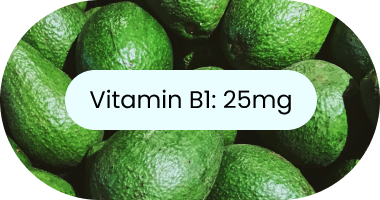
What is this?
Vitamin B1, also known as thiamine, is a water-soluble vitamin that plays a key role in carbohydrate metabolism, nervous system function, and energy production. In the late 19th century, Dutch physician Christiaan Eijkman discovered that eating brown rice prevented a nervous system disease called beriberi, which was later linked to thiamine deficiency. Vitamin B1 was first isolated in 1926 and synthesized in 1936 by American chemist Robert R. Williams, who also gave it the name “thiamine.”
WHY INCLUDE IT?
Vitamin B1 is essential for the proper functioning of the body, especially for the nervous system and energy metabolism. It also contributes to the normal functioning of the heart, energy production and psychological functions.
DID YOU KNOW?
Thiamine deficiency can especially affect those who follow a high-carbohydrate diet, as extra amounts may be needed for metabolism. Vitamin B1 is the silent engine of everyday energy production.
WANT TO LEARN MORE?
References (peer-reviewed scientific studies):
Gibson, GE, Hirsch, JA, Fonzetti, P., Jordan, B., Cirio, RT, & Elder, J. (2016). Vitamin B1 (thiamine) and dementia. Annals of the New York Academy of Sciences, 1367(1), 21–30. Bettendorff, L. (2012). The chemistry, biochemistry and metabolism of thiamin (vitamin B1). In The Handbook of Vitamins (pp. 71–92). Royal Society of Chemistry. Bozic, M., Milenković, M., Pavlović, D., Stamenković, M., & Pavlović, A. (2022). Vitamin B1, eye and brain. Srpski Arhiv za Celokupno Lekarstvo, 150(9–10), 663–667.
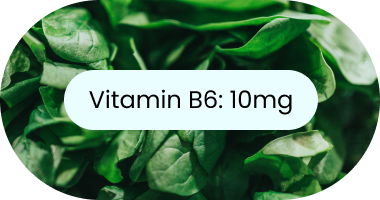
What is this?
Vitamin B6, also known as pyridoxine, is a water-soluble vitamin that is involved in many metabolic processes. Its active form, pyridoxal-5'-phosphate (PLP), is involved in over 100 enzymatic reactions, including the synthesis of neurotransmitters such as serotonin, dopamine, and GABA.
WHY INCLUDE IT?
Vitamin B6 contributes to the reduction of tiredness and fatigue, normal energy-yielding metabolism and the normal functioning of the nervous system.
DID YOU KNOW?
B6 deficiency can also be associated with skin symptoms, nervous system disorders, and fatigue. Adequate intake also contributes to the maintenance of normal immune and psychological functions – which is why it is often included in conscious nutritional supplement routines.
WANT TO LEARN MORE?
References (peer-reviewed scientific studies):
Malouf, R., & Grimley Evans, J. (2003). Vitamin B6 for cognition. Cochrane Database of Systematic Reviews, 2, CD004393. Rezaeimanesh, N., Saeedi, R., & Farsani, M. (2020). Higher vitamin B6 intake and cognitive benefits in neuromyelitis optica. Nutritional Neuroscience, 23(8), 641–648. Zhang, Y., Luo, Y., & Wang, X. (2020). Vitamin B12, B6 or folate and cognitive function: Systematic review and meta-analysis. Journal of Alzheimer's Disease, 75(1), 45–59. Jannusch, K., Jockwitz, C., & Caspers, S. (2017). Vitamin B6 metabolism and brain structure in older adults. Neurobiology of Aging, 60, 179–187. Scott, TM, & Tucker, KL (2013). Low vitamin B6 predicts cognitive decline and depression. American Journal of Clinical Nutrition, 98(3), 724–731.
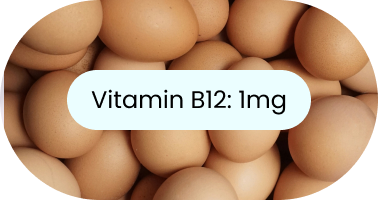
What is this?
Vitamin B12, also known as cobalamin, is a water-soluble vitamin that plays a vital role in the synthesis of DNA in cells, the functioning of the nervous system, and the formation of red blood cells. It was discovered in the early 20th century when it was observed that eating raw liver improved the condition of people suffering from pernicious anemia. The structure of vitamin B12 was determined in 1956 by Dorothy Hodgkin, for which she received the Nobel Prize in 1964.
WHY INCLUDE IT?
Vitamin B12, which is included in the formula, is a well-known nutrient that is present in many metabolic processes, and has been thoughtfully included in our composition accordingly.
DID YOU KNOW?
Vitamin B12 contributes to the normal function of the nervous system, the reduction of tiredness and fatigue, and normal energy production. Adequate vitamin B12 intake is particularly important for cell division, the functioning of the nervous system, and energy production.
WANT TO LEARN MORE?
References (peer-reviewed scientific studies):
Morris, MS, Jacques, PF, & Rosenberg, IH (2012). Vitamin B12 and memory function. Journal of the American Geriatrics Society, 60(12), 2164–2170. Zhang, Y., Luo, Y., & Wang, X. (2020). Vitamin B12, B6 or folate and cognitive function: Systematic review and meta-analysis. Journal of Alzheimer's Disease, 75(1), 45–59. Troen, AM (2012). Folate and vitamin B12 function and importance in cognitive development. Nestlé Nutrition Institute Workshop Series, 70, 83–95. Markun, S., Gravestock, I., Jäger, L., & Rosemann, T. (2021). Effects of vitamin B12 supplementation on cognitive function: Systematic review. Nutrients, 13(3), 923.
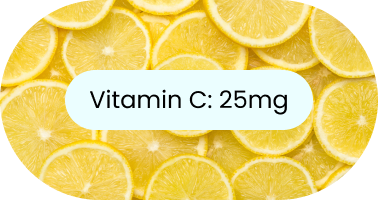
What is this?
Vitamin C, also known as ascorbic acid, is a water-soluble, essential nutrient that was first isolated from the adrenal glands of Hungarian scientist Albert Szent-Györgyi in 1928. He later discovered that paprika was an excellent source of this substance and was able to produce it in larger quantities. Szent-Györgyi received the Nobel Prize in 1937 for his work.
WHY INCLUDE IT?
Vitamin C is involved in many biochemical processes, including the synthesis of collagen, which is important for the health of skin, blood vessels and bones. It also acts as an antioxidant, helping to protect cells from oxidative stress.
DID YOU KNOW?
Vitamin C deficiency could cause a disease called scurvy among sailors, so consuming citrus fruits was a life-saving measure for centuries. Today, vitamin C is a staple of the everyday diet, which the body cannot produce on its own.
WANT TO LEARN MORE?
References (peer-reviewed scientific studies):
Travica, N., Ried, K., Sali, A., Scholey, A., & Pipingas, A. (2017). Vitamin C status and cognitive function: A systematic review. Nutrients, 9(9), 960. Hansen, SN, Tveden-Nyborg, P., & Lykkesfeldt, J. (2014). Does vitamin C deficiency affect cognitive development and function? Nutritional Neuroscience, 17(4), 139–150. Dixit, S., Bernardo, A., Walker, JM, Kennard, JA, & Kim, GY (2015). Vitamin C deficiency in the brain impairs cognition, increases amyloid accumulation and deposition. Neurobiology of Aging, 36(1), 1–12.
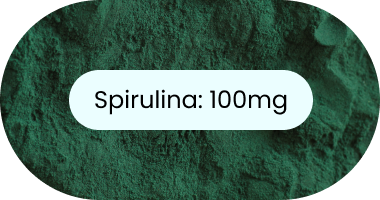
What is this?
Spirulina – or its scientific name is Arthrospira platensis – is a microscopic, spiral-shaped algae that was consumed by the Aztecs. Spanish conquistadors collected it from Lake Texcoco in Mexico and used it as a food called “tecuitlatl”. Scientific interest in spirulina began to revive in the 1960s and is still going strong today.
WHY INCLUDE IT?
Spirulina has become popular in modern dietary supplements due to its exceptional nutritional content. Its presence in the lumiblu Focus formula reflects our commitment to naturally sourced, historically valuable ingredients.
DID YOU KNOW?
Spirulina has also attracted the interest of NASA and the European Space Agency as a potential food source for long-duration space missions. Research has investigated spirulina's antioxidant properties and nutritional content, particularly its protein and vitamin composition.
WANT TO LEARN MORE?
References (peer-reviewed scientific studies):
Choi, W., Lee, W.-K., Kim, T., Ryu, Y.-K., Park, A., Lee, Y.-J., Heo, S., Oh, C., Chung, Y.-C., & Kang, D. (2022). The effects of Spirulina maxima extract on memory improvement in those with mild cognitive impairment: A randomized, double-blind, placebo-controlled clinical trial., Nutrients, 14(18), 3714., Koh, E.-J., Kim, K.-J., Song, J., Choi, J., Lee, H., Kang, D., Heo, H., & Lee, B.-Y. (2017). Spirulina maxima extract ameliorates learning and memory impairments via inhibiting GSK-3β phosphorylation induced by intracerebroventricular injection of Amyloid-β 1–42 in mice. International Journal of Molecular Sciences, 18(11), 2401. Kumar, S., Saha, S., Singh, K., Singh, T., Miahra, AK, Dubey, B., & Singh, S. (2024). Beneficial effects of Spirulina on brain health: A systematic review. Current Functional Foods, 2024, Advance online publication.
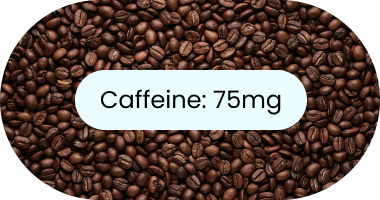
What is this?
Caffeine is a natural compound found in coffee, tea and cocoa. It works by blocking receptors for a substance called adenosine in the body – thereby helping to reduce feelings of fatigue, acting as a natural stimulant.
WHY INCLUDE IT?
Caffeine is a well-known and widely used ingredient that naturally contributes to a sense of mental alertness. It is included in a balanced amount in the lumiblu Focus formula.
DID YOU KNOW?
Caffeine isn't just in your morning coffee: it's been a part of our culture for centuries. Ethiopian shepherds first noticed its stimulating effects when they noticed their goats getting more alert from the leaves of the coffee bush. Today, it's found in a variety of supplements, drinks, and snacks.
WANT TO LEARN MORE?
References (peer-reviewed scientific studies):
Smith, A. (2018). Caffeine and cognitive performance: A review of human research. Psychopharmacology, 236(1), 1–14. Einöther, SJL, & Giesbrecht, T. (2019). Caffeine as an attention enhancer: Review and meta-analysis. Neuroscience & Biobehavioral Reviews, 102, 342–349. Lorist, MM, & Tops, M. (2022). Caffeine improves mental focus and reaction time. Journal of Cognitive Enhancement, 6(2), 191–205. Ruxton, C., Hoyland, A., & Lloyd, H. (2020). The cognitive effects of caffeine: Systematic review. European Journal of Clinical Nutrition, 74(4), 1–13. Haskell-Ramsay, CF, Jackson, PA, & Forster, JS (2021). Cognitive and mood effects of caffeine during fatigue. Nutritional Neuroscience, 24(2), 123–135.
